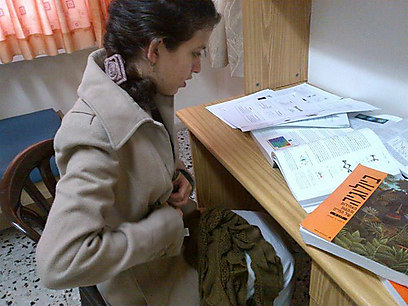
Student expelled for 'doubting faith'
Young woman ordered to leave ultra-Orthodox nursing school after management learns she is considering abandoning haredi world. Before expulsion, institution demands she get psychological help from haredi therapist at her own expense
Before ordering the young woman to leave, the institution demanded that she get psychological help from a female haredi therapist at her own expense while signing a violation of secrecy agreement, and provide reports from a rabbi about her level of faith.
Due to the expulsion, 22-year-old Chavi Loyfer lost credit for most of the courses she took throughout the year and was forced to complete them at her own expense in a different institution.
Hearing in front of 'spiritual committee'
The Tessler School of Nursing, which is part of the Sanz Medical Center at the Laniado Hospital in Netanya, is an educational institution for haredi and religious girls and is affiliated with the Sanz Hasidic movement. Loyfer, a Jerusalem resident who graduated from a seminary for girls in the capital, decided to continue her professional nursing studies there.

'I was forbidden to discuss faith issues with other girls.' Loyfer
When she began her studies about two years ago, she was asked to sign a modesty code as a condition to study in the school – an acceptable move in religious and haredi institutions.
"At the time, after graduating from the seminary, I was haredi," she says. "They made me sign a dress code at the time, and I obeyed it all the way. In my head I think I began abandoning (the haredi lifestyle) around the Shavuot holiday, about a year ago, but I continued dressing that way and doing everything else. Even in Jerusalem I maintained a haredi appearance because of them, as I signed and committed to doing so."
But according to Loyfer, the fact that she obeyed the rules was not enough. "Somehow, the management found out what I was going through. One of the girls told the dormitories' matron, and she reported it to the principal and spiritual supervisor, who decided to summon me to a hearing in front of a spiritual committee."
Hair not tied up properly
In early January this year, in the middle of class, Loyfer was summoned to the office of the principal, Esther Strauss.
"The matron and Rabbi Glick, the "spiritual director," were also there," she recalls. "They told me they had heard rumors about my spiritual condition, and then Rabbi Glick complained that I was wearing a polo-neck shirt, which wasn't modest enough for him, and that my hair wasn't tied up the way he wanted it to be."
According to Loyfer, "Clearly that was just an excuse… My hair was shoulder length, and girls with much longer hair used to wear it down. It was, in my opinion, an attempt to show that I was not obeying the code, which was not true."
She quickly learned that the comments on her shirt and hair were just the beginning.
"They expressed an interest in the condition of my faith, and I told them openheartedly that I was experiencing problems with it. I could have lied, but I chose not to. I told them that I would be stricter in regards to the shirt and hair, noting that I was always very strict. But they said in response that was not what they were really interested in."
According to Loyfer, the "committee" decided to make her sign a "special set of rules" composed specifically for her if she wished to continue her studies.
"They wanted me to sign a document in which I promise to avoid even the slightest deviation from the modesty code, and they forbade me to discuss faith issues with the other girls. They also demanded that I meet with a haredi psychologist selected by them in Netanya, so that she could 'treat me' at my own expense.
"They further demanded that I sign a violation of secrecy form with that therapist, so that she could report to them about my spiritual condition. I agreed to everything, even to the psychologist at first, but I wouldn't sign the violation of secrecy form."
Loyfer agreed to meet with a rabbi the educational staff would approve of, obey the dress code down to the very last detail and limit the topics of conversation with her classmates. Her demand to receive the "special document" or the meeting's protocol was rejected.
"They told me explicitly that they feared I would use it for legal purposes," she says.
Immediate expulsion
About two weeks after that hearing, the school decided to bring Rabbi Yitzchak Fanger from the Hidabroot (Hebrew for discussion) organization to discuss faith issues with the nursing school students. Loyfer is convinced that she was the reason for that.
"As they forbade me to discuss these issues publicly, I approached the principal and asked her if I could ask him any questions or if I was banned from doing so. She replied that I could ask whatever I wanted, and that that was the reason she had brought him."
According to Loyfer, the rabbi's lecture quickly developed into a dialogue, while the principal listened on the side. "It's was disrespectful. We were arguing like three-year-olds. A day after the lecture, the principal summoned me and said she hadn't realized how 'serious' the condition of my faith was.
"I told her that she was the one who had told me to ask the questions, and that I had met all the new rules they had set for me. The principal admitted that it was true, but said that she would still not let me continue studying, and demanded that I leave the school immediately. I asked her to at least provide me with an official letter that I was being expelled from school, but she wouldn't even give me that."
'Rabbi said I don't constitute a danger'
At the Tessler Nursing School, studies last two years without vacations and are equivalent to three years of study in other institutions. Loyfer explains that expelling her in the middle of the second year meant that she had to repeat an entire year at a different place and lose the option to start working at the end of the current, second year.
"I basically had to study an entire year all over again – and not work either. They treated me very badly, especially after I met all the new demands they presented me with. Even the rabbi in Jerusalem I was in touch with tried to tell them that I did not constitute a threat, but they wouldn't listen."
Today Loyfer is restudying the courses she already took at the Shaare Zedek School of Nursing in Jerusalem.
"I am already taking exams, so it won't help me shorten my studies, but I am definitely considering suing," she says. "They did something illegal and unjust, both in the expulsion and in the fact that they wouldn't even give me a letter.
"I can't be responsible for what I feel. They can't force faith as a regulation or as a condition. And I did meet everything they did force."
Loyfer adds that "it's unbelievable that in the State of Israel someone can be expelled from school over their religious faith. Had it been the other way around, the entire haredi sector would have risen up against it.
"They did something illegal and they must be punished for it. I am a student, I don't have money, and every such payment for courses and postponing my ability to make a living off the profession causes real damage."
A spokesperson for the Tessler School of Nursing said in response, "This is a unique nursing school, and students are aware of the school's conditions. They know that a student who fails to meet the conditions – there are plenty of other institutions she can study in."
The Health Ministry offered the following statement in response: "The Ministry learned of the incident following the appeal. Had we known about it in real time, we would not have approved the decision to stop the student's studies.
"The Health Ministry views discrimination of any kind extremely seriously. As months have passed and the young lady has integrated into the Shaare Zedek school, we wish her luck with the rest of her career."










